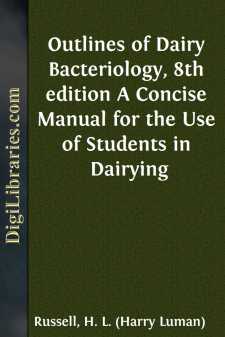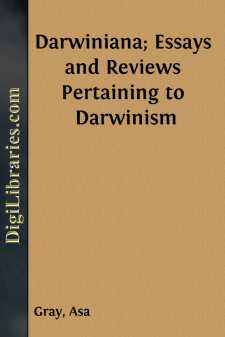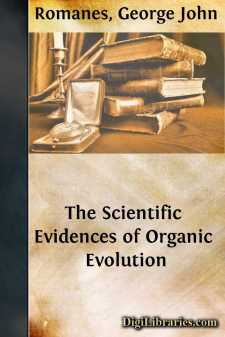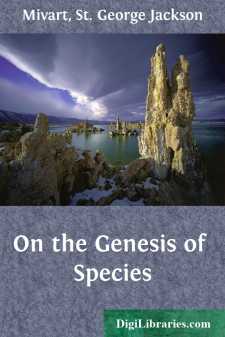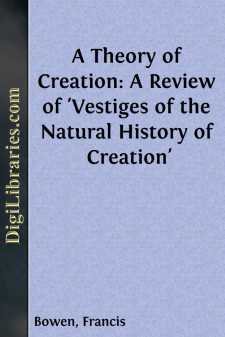Science
- Astronomy 18
- Biology
- Chemistry 13
- Electricity 1
- General 38
- History 6
- Light 1
- Paleontology 2
- Philosophy & Social Aspects 1
- Physics 3
- Relativity 2
- Study & Teaching 1
- Waves & Wave Mechanics 1
Biology Books
Sort by:
CHAPTER I. STRUCTURE OF THE BACTERIA AND CONDITIONS GOVERNING THEIR DEVELOPMENT AND DISTRIBUTION. Before one can gain any intelligent conception of the manner in which bacteria affect dairying, it is first necessary to know something of the life history of these organisms in general, how they live, move and react toward their environment. Nature of Bacteria. Toadstools, smuts, rusts and mildews are...
more...
PREFACE. The present volume consists of essays which I have contributed to various periodicals, or read before scientific societies during the last fifteen years, with others now printed for the first time. The two first of the series are printed without alteration, because, having gained me the reputation of being an independent originator of the theory of “natural selection,” they may be...
more...
by:
Asa Gray
These papers are now collected at the request of friends and correspondents, who think that they may be useful; and two new essays are added. Most of the articles were written as occasion called for them within the past sixteen years, and contributed to various periodicals, with little thought of their forming a series, and none of ever bringing them together into a volume, although one of them (the...
more...
THE SCIENTIFIC EVIDENCES OF ORGANIC EVOLUTION. Although it is generally recognised that the Origin of Species has produced an effect both on the science and the philosophy of our age which is without a parallel in the history of thought, admirers of Mr. Darwin's genius are frequently surprised at the ignorance of his work which is displayed by many persons who can scarcely be said to belong to the...
more...
IN the lecture which I delivered last Monday evening, I endeavoured to sketch in a very brief manner, but as well as the time at my disposal would permit, the present condition of organic nature, meaning by that large title simply an indication of the great, broad, and general principles which are to be discovered by those who look attentively at the phenomena of organic nature as at present displayed....
more...
The inquiry which we undertook, at our last meeting, into the state of our knowledge of the causes of the phenomena of organic nature,—of the past and of the present,—resolved itself into two subsidiary inquiries: the first was, whether we know anything, either historically or experimentally, of the mode of origin of living beings; the second subsidiary inquiry was, whether, granting the origin, we...
more...
INTRODUCTORY. The problem of the genesis of species stated.—Nature of its probable solution.—Importance of the question.—Position here defended.—Statement of the Darwinian Theory.—Its applicability to details of geographical distribution; to rudimentary structures; to homology; to mimicry, &c.—Consequent utility of the theory.—Its wide acceptance.—Reasons for this, other than, and...
more...
MERCHANTS occasionally go through a wholesome, though troublesome and not always satisfactory, process which they term "taking stock." After all the excitement of speculation, the pleasure of gain, and the pain of loss, the trader makes up his mind to face facts and to learn the exact quantity and quality of his solid and reliable possessions. The man of science does well sometimes to imitate...
more...
I EVOLUTION. THE LIVING ORGANISM AND ITS NATURAL HISTORY The Doctrine of Evolution is a body of principles and facts concerning the present condition and past history of the living and lifeless things that make up the universe. It teaches that natural processes have gone on in the earlier ages of the world as they do to-day, and that natural forces have ordered the production of all things about which...
more...
by:
Francis Bowen
THEORY OF CREATION. Vestiges of the Natural History of Creation. New York: Wiley & Putnam. 1845. 12mo. pp. 291. This is one of the most striking and ingenious scientific romances that we have ever read. The writer of it is a bold man; he has undertaken to give a hypothetical history of creation, beginning, as the title-pages say, at the earliest period, and coming down to the present day. It is not...
more...


